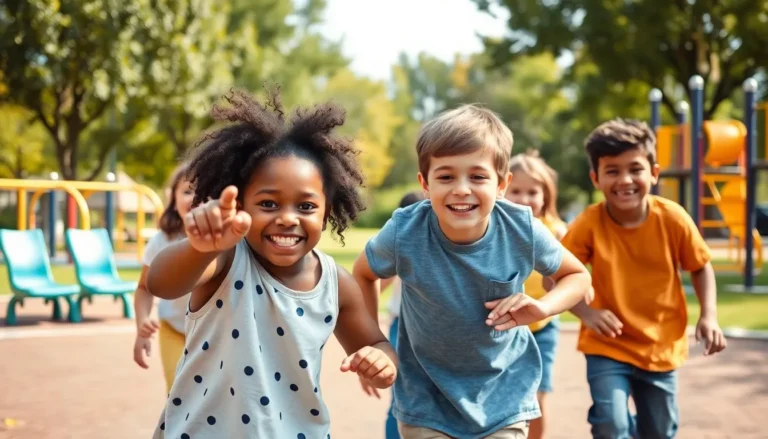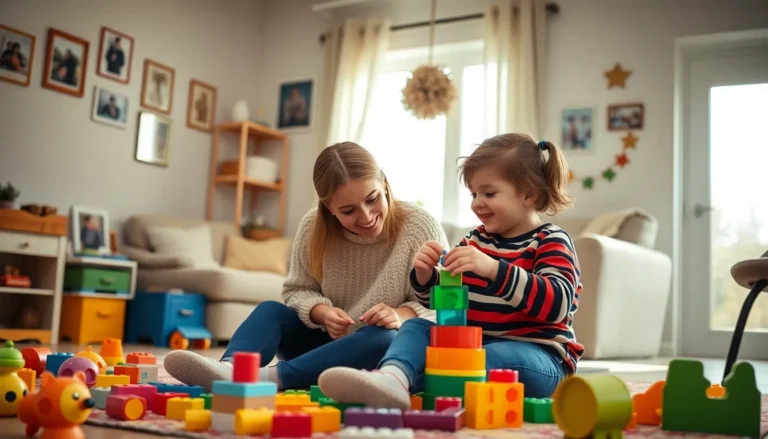Table of Contents
ToggleNavigating a divorce can feel like trying to assemble IKEA furniture without the manual—confusing and a bit chaotic. Amid the emotional whirlwind, the courts often require parenting classes to ensure that kids don’t end up as collateral damage in the adult drama. These classes aren’t just another item on the to-do list; they’re a lifeline for parents striving to maintain a stable environment for their children.
Think of them as a crash course in co-parenting—complete with expert tips and a supportive community. By attending, parents can learn how to communicate effectively, manage conflict, and prioritize their children’s well-being. In a world where parenting feels like a never-ending episode of a reality show, these classes provide the tools to keep the drama off-screen and focus on what really matters: raising happy, healthy kids.
Importance of Parenting Classes
Parenting classes play a crucial role during divorce proceedings. These classes offer essential strategies for effective communication between parents. Effective communication helps mitigate conflicts that arise from separation. Parents learn techniques for managing emotions and avoiding negative interactions.
Understanding child development is another vital aspect of these classes. Parents gain insights into their children’s emotional needs during this stressful period. They discover how divorce affects children, prompting them to adopt healthier parenting practices.
Support systems also form during these classes. Parents connect with other individuals facing similar challenges. Sharing experiences fosters a sense of community and reduces feelings of isolation.
Some programs focus on co-parenting strategies. These strategies encourage parents to collaborate for their children’s best interests. Strong co-parenting relationships lead to improved stability for children amidst the changes of divorce.
Empirical evidence supports the effectiveness of parenting classes. Studies indicate that families who participate in such programs report lower levels of conflict post-divorce. Additionally, children from these families often exhibit better emotional well-being and academic performance.
Legal requirements often mandate attendance at parenting classes before finalizing a divorce. Courts recognize the importance of equipping parents with the skills needed to navigate this transition successfully. Fulfilling these requirements helps ensure the overall well-being of children involved.
Mandated parenting classes represent a proactive approach to addressing the challenges of divorce. Prioritizing children’s needs equips parents with the necessary tools for positive outcomes. Ultimately, these efforts aim to cultivate a nurturing environment where children can thrive despite their parents’ separation.
Benefits of Parenting Classes
Parenting classes provide essential skills and knowledge for parents navigating divorce. These educational programs equip them to respond effectively to their children’s needs during this transition.
Enhancing Co-Parenting Skills
Co-parenting skills improve significantly through parenting classes. Participants learn techniques that promote teamwork and communication, which are crucial for parenting after separation. Strategies include setting shared goals and discussing important decisions collaboratively. Classes often teach conflict resolution methods, enabling parents to handle disagreements constructively. Improved co-parenting fosters a more stable environment for children, contributing to their emotional stability and well-being. Parents learn to prioritize their child’s needs and maintain a united front, even after their relationship has ended.
Reducing Conflict Between Parents
Conflict reduction becomes a primary focus in parenting classes. These programs emphasize effective communication skills that minimize misunderstandings. Parents gain insight into managing emotions, allowing them to engage in healthier discussions. Learning conflict management techniques helps parents avoid escalation during disagreements. As parents reduce conflict, the overall environment for children improves, contributing to less stress in their lives. Maintaining civility promotes a sense of security, ultimately benefiting children’s emotional and psychological development during and after the divorce.
Legal Requirements for Parenting Classes
Parenting classes often serve as a prerequisite in divorce proceedings. Courts recognize the importance of these courses in equipping parents with crucial skills.
State-Specific Regulations
Variations exist across different states regarding parenting class regulations. Many jurisdictions require parents to complete a specified number of hours in educational programs before finalizing a divorce. Courts may mandate these classes to ensure that parents understand co-parenting responsibilities and the impact of divorce on children. Specific subjects often covered include conflict resolution, child development, and emotional support strategies. These regulations aim to enhance parenting techniques, fostering a healthier environment for children.
Court-Mandated Programs
Court-mandated programs typically require completion for parents seeking divorce. These programs focus on equipping parents with essential methods for effective communication and conflict management. Mandated attendance emphasizes the role of parents in mitigating stress and impact on children during the divorce process. Participants learn strategies designed to prioritize child well-being, reduce disputes, and create stable co-parenting frameworks. In many cases, failure to complete these programs may delay the divorce process, highlighting their importance in judicial proceedings.
Emotional Support for Children
Emotional support for children remains crucial during a divorce. Parents equipped with knowledge from parenting classes can significantly address the emotional needs of their children. Understanding how divorce impacts children lays the foundation for healthier interactions. Such awareness allows parents to be more empathetic, creating a nurturing environment that fosters emotional stability.
Reducing parental conflict is vital for children’s emotional well-being. During parenting classes, participants learn constructive communication techniques which directly influence their children’s mental and emotional health. Taking steps to minimize misunderstandings between parents helps cultivate a sense of security for children during turbulent times. Emphasizing co-parenting strategies further encourages collaboration directed at the child’s best interests.
In addition, support from peers facing similar challenges proves beneficial. Sharing experiences creates networks of understanding, allowing parents to feel connected during a typically isolating experience. Many programs focus on building those connections, fostering a supportive community where parents can exchange insights.
Long-term effects on children’s emotional development underscore the importance of these classes. Research indicates that children from families participating in parenting education often exhibit better emotional regulation and improved academic performance. By prioritizing emotional support through effective parenting practices after divorce, parents lay a stronger foundation for their children’s future.
Recognizing the significant role of emotional well-being varies across different jurisdictions. Courts increasingly emphasize the importance of parenting classes in minimizing the adverse impacts of divorce on children. Attendance often signals a commitment to maintaining a healthy emotional environment for children, ensuring they experience a smoother transition during this challenging time.
Parenting classes are essential during a divorce as they equip parents with the necessary skills to navigate this challenging transition. By focusing on effective communication and conflict resolution, these classes help reduce tensions that can negatively impact children. Parents learn to prioritize their children’s emotional needs, fostering a supportive environment that promotes stability amidst change.
The insights gained from these programs not only enhance co-parenting relationships but also contribute to children’s emotional well-being and academic success. Courts recognize the value of these classes, often making them a legal requirement before finalizing a divorce. Ultimately, parenting classes serve as a crucial tool in ensuring that children thrive despite the challenges of their parents’ separation.




